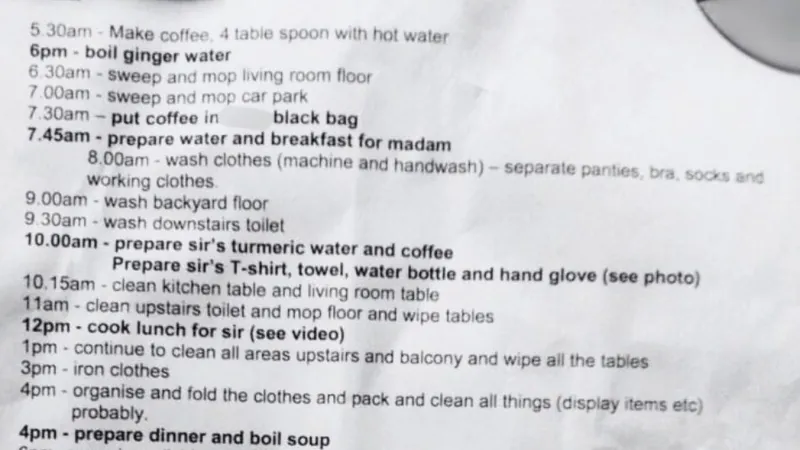
Unseen Struggles: The Grueling Reality of Domestic Workers in Singapore
2025-01-09
Author: Wei
Introduction
In Singapore, domestic workers face an uphill battle for their rights and well-being, as revealed by a harrowing account shared by one migrant domestic worker (MDW) with the HOME: Humanitarian Organisation for Migration Economics. This organisation advocates for the rights of migrant workers in the country and aims to bring attention to the daunting working conditions many of these individuals experience daily.
Grim Working Conditions
Recently, HOME published a photo of an MDW's work schedule that paints a stark picture of her relentless daily grind. Starting as early as 5:30 AM with tasks like preparing coffee and boiling ginger water, her day does not conclude until past 11 PM. The schedule outlines a never-ending series of chores, illustrating the exhausting demands placed on these workers, who are often left with minimal time to rest.
Ria's Story
In a post made by the organization, the alleged worker, who has been given the pseudonym Ria to protect her identity, described her perpetual state of exhaustion due to the rigid adherence to her demanding schedule. Despite being granted one rest day per month, Ria's time off is hardly a break; she is obligated to complete household chores before she can leave the house, only to return to more work later in the day.
Government Response
The Ministry of Manpower (MOM) in Singapore has suggested that legislating working hours for MDWs is "not practical" due to the need for household flexibility, yet this so-called flexibility comes at a hefty price for the MDWs' health. Many report feeling overworked, and when they seek shorter working hours, they are often met with dismissive retorts from their employers, such as, "You are here to work, not relax!"
Challenges of Caregiving MDWs
This is compounded further for MDWs with caregiving duties, who might have to attend to their care recipients throughout the night, severely limiting their ability to get adequate sleep. Unfortunately, as these domestic workers lack protection under the Employment Act—which governs working hours for other professions—they remain vulnerable to exploitation. Employers hold the power to terminate their contracts and repatriate them, even if they desire to continue their work under better conditions.
Call for Legislative Change
Advocacy organizations like HOME are urging for legislative changes that would grant MDWs the same protections as other workers in Singapore. They argue that it is critical to define "adequate rest" clearly and enforce regulations that provide for weekly rest days—ideally defined as 24 continuous hours—to safeguard the health and dignity of these essential workers.
Conclusion
Since its inception in 2004, HOME has taken significant steps to support and advocate for migrant domestic workers, working alongside corporations and government agencies to foster an environment of inclusion and justice. The necessity for change in the treatment of MDWs is undeniable, as their rights and welfare are crucial for a balanced and humane labor environment in Singapore. As the conversation around worker rights continues to evolve, it is imperative for society to consider the unseen struggles of domestic workers and work towards a more just and equitable treatment for all involved.
 Brasil (PT)
Brasil (PT)
 Canada (EN)
Canada (EN)
 Chile (ES)
Chile (ES)
 Česko (CS)
Česko (CS)
 대한민국 (KO)
대한민국 (KO)
 España (ES)
España (ES)
 France (FR)
France (FR)
 Hong Kong (EN)
Hong Kong (EN)
 Italia (IT)
Italia (IT)
 日本 (JA)
日本 (JA)
 Magyarország (HU)
Magyarország (HU)
 Norge (NO)
Norge (NO)
 Polska (PL)
Polska (PL)
 Schweiz (DE)
Schweiz (DE)
 Singapore (EN)
Singapore (EN)
 Sverige (SV)
Sverige (SV)
 Suomi (FI)
Suomi (FI)
 Türkiye (TR)
Türkiye (TR)
 الإمارات العربية المتحدة (AR)
الإمارات العربية المتحدة (AR)